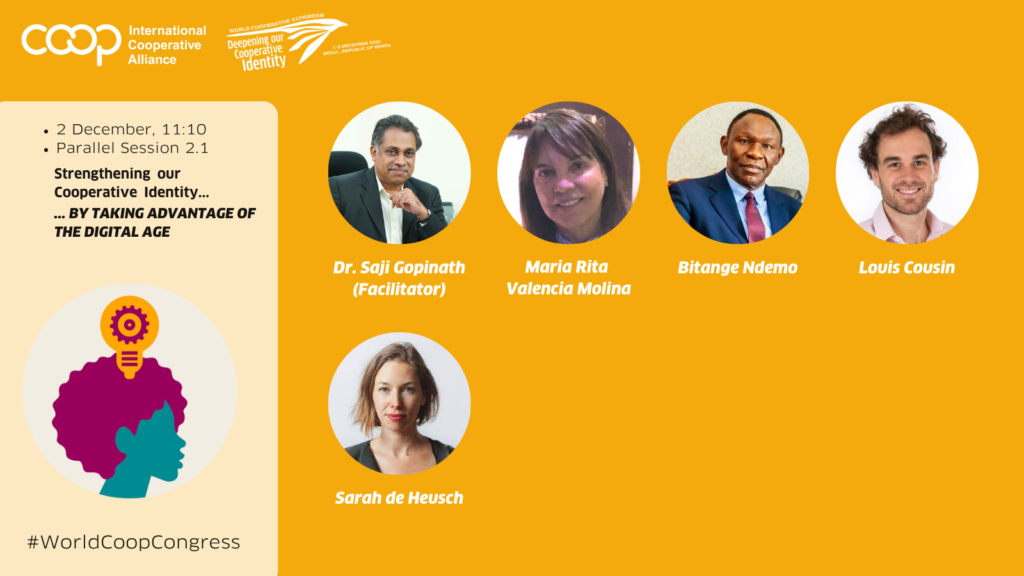
Parallel session 2.1 of the World Coop Congress explored how the cooperative movement can strengthen its identity by taking advantage of the digital age.
Dr. Saji Gopinath, Vice Chancellor of Kerala University of Digital Sciences, Innovation and Technology, chaired the session, and opened the discussion by saying: “As the digital world is bringing in new models of organisations and collective entrepreneurship, it is worthwhile to see how these technologies and philosophies are leveraged by cooperatives all across the world to strengthen their cooperative identity, existence and growth.”
Dr. Gopinath then drew parallels between the principles of cooperation and some of the philosophies which drive new digital enterprises, such as voluntarism, collaboration, autonomy and independence. Dr. Gopinath said that these principles “have a striking similarity with the principles of cooperation, which makes cooperatives the ideal model for the new age enterprise.”
The first panelist to present to the session was Prof. Bitange Ndemo, Professor of Entrepreneurship at the University of Nairobi’s School of Business, who spoke about the key technologies that will impact cooperatives in the fourth industrial revolution, including blockchain and machine learning.
Prof. Ndemo spoke about different ways blockchain technology may be of use to cooperatives, for example blockchain-based coop legislation and administration, decentralised financial services and the enablement of greater financial inclusivity through increased access to loans for micro and small to medium enterprises. This has been seen most recently in Kenya and Ghana, Prof. Ndemo explained.
Sarah de Heusch presented on behalf of La Coop des Communs to speak about the initiative Plateformes en Commun, which aims to enable platform coops through cooperation, as well as posing the question:. “How do we use these platforms to really enhance and boost the social and environmental transition that our societies need?”
Delegates then heard from Maria Rita Valencia Molina, National Manager of Education and Democracy at Coomeva in Colombia, who spoke about Coomeva’s ‘Thinking Space’, a physical and virtual space that “collects and communicates the essence of Coomeva and its historical memory, while promoting cooperativism.” Ms Valencia Molina said that Coomeva considers their Thinking Centre “to be a sample of how cooperatives can deploy processes to strengthen their identity, making use of the possibilities offered by digital environments.”
Ms Valencia Molina went on to stress the importance of intercooperation in the new digital age, saying: “cooperatives are a great global network. If we can maximise that network through technology, we can produce extraordinary results in terms of cooperation between cooperatives.”
Echoing this sentiment was Louis Cousin from Startin’blox in Canada, who spoke about how to translate the cooperative identity into cooperative information systems, which he stated is a requirement for the cooperative movement if it is to compete with large tech players such as Amazon. Mr Cousin highlighted the sixth cooperative principle of intercooperation and the seventh principle of concern for the community as key considerations in this endeavour.
While there were many positives raised in relation to digital opportunities for the coop movement, challenges and concerns were also explored by the participants.
In the later part of the session, a question was put forward by a member of the audience about the practice of “blitzscaling”, the encouragement of rapid growth often seen in the tech sector which can be undemocratic and unethical. In response, Ms Heusch said that “we need to stop thinking ‘fast return on investment.’ We need to start thinking in terms of commons.”
Mr Cousin also highlighted a need for more conversation within the cooperative movement about “technological choices” and the implications of using certain tech over others. “There is a space for technological debate within a cooperative framework,” said Mr Cousin, adding, “we know that cooperative platforms are viable, they are transformative and we should support them. But now it’s our goal to talk among each other, confront the different choices we’ve made and build some common visions together.”
